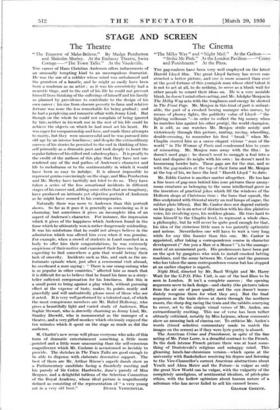"The Milky Way" and "Night-Mail." At the Carlton
The Cinema
" Strike Me Pink." At the London Pavilion—" Crime and Punishment." At the Plaza.
THE gag-makers have been very well employed on the latest Harold Lloyd film. The great Lloyd factory has never con- structed a better picture, and one is more amazed than ever at the good fortune of this youngish man whose chief talent it is not to act at all, to do nothing, to serve as a blank wall for other people to scrawl their ideas on. He is a very amiable blank, he doesn't mind others acting, and Mr. Adolphe Menjou in The Milky Way acts with the toughness and energy he showed in The Front Page. Mr. Menjou in this kind of part is unbeat- able, the part of a crooked boxing manager who nurses, by means of phoney fights, the publicity value of Lloyd—" the fighting milkman "—in order to collect the big money when he matches him against his other protege, the world champion. It is odd, as one watches Mr. Menjou stride noisily and victoriously through this picture, ranting, raving, wheedling, double-crossing, to remember his first break " when Mr. Chaplin starred him as a suave elegant vicious " man of the world " in The Woman of Paris and condemned him to years of miscasting. Mr. Menjou runs away with the film : he doesn't need gags : he doesn't need to smuggle a foal into a taxi and disguise its neighs with his own : he doesn't need to boomerang bowler hats. These gags are for the star, and so with the gag-makers at the top of their form and Mr. Menjou at the top of his, we have the best " Harold Lloyd " to date.
Mr. Eddie Cantor is another matter altogether. He too has a fine team of gag-men behind him (one pictures these anony- mous creatures as belonging to the same intellectual genre as the inventors of practical jokes which fill the windows of the Holborn shops at Christmas time : the buns that squeak, the flies sculptured with Oriental nicety on real lumps of sugar, the rubber plate lifters). But Mr. Cantor does not depend entirely on his gags ; he is an actor of distinction with his dim plaintive voice, his revolving eyes, his reckless gleam. He tries hard to raise himself to the Chaplin level, to represent a whole class, a philosophy, but he will never be quite good enough for that, his idea of the victorious little man is too patently optimistic and untrue. Nevertheless one will have to wait a very long while for any film funnier than this one. Mr. Cantor in appointed, after taking a correspondence course in character development (" Are you a Man or a Mouse ? "), to the manage- ment of an amusement park. His predecessors have been put on the spot by gangsters who wish to install crooked betting machines, and the scene between Mr. Cantor and the gunman who has taken the same correspondence course but has stopped at an earlier chapter is superb.
Night Mail, directed by Mr. Basil Wright and Mr. Harry Watt for the G.P.O. Film Unit, is one of the best films to be seen in London. It isn't a complete success ; the opening sequences seem to lack design—and clarity (the pictures taken from the air are of poor quality and the eye doesn't imme- diately recognise them for what they are). But the final sequences as the train drives at dawn- through the northern moors, the sheep dog racing the train and the rabbits scurrying to cover, set to the simple visual verses of Mr. Auden, are extraordinarily exciting. This use of verse has been rather obtusely criticised, notably by Miss Lejeune, whose comments show an amazing lack of cinema ear. To criticise Mr. Auden's words (timed selective commentary made to match the images on the screen) as if they were lyric poetry is absurd.
The American Crime and Punishment, in spite of the fine acting of Mr. Peter Lorre, is a dreadful contrast to the French. In the dark intense French picture there was at least some- thing of Dostoievski's religious and unhappy mind. This gleaming lunch-bar-chromium version—which opens at the university with Itaskohuliov receiving his degree and listening to the Vice-Chancellor's earnest American abstractions about Youth and Alma Mater and the Future—is vulgar as only the great New World can be vulgar, with the vulgarity of the completely unreligious, of sentimental idealism, of pitch-pine ethics, with the hollow optimism about human nature of a salesman who has never failed to sell his canned beans.
GRARAht GREMiE.


































































 Previous page
Previous page